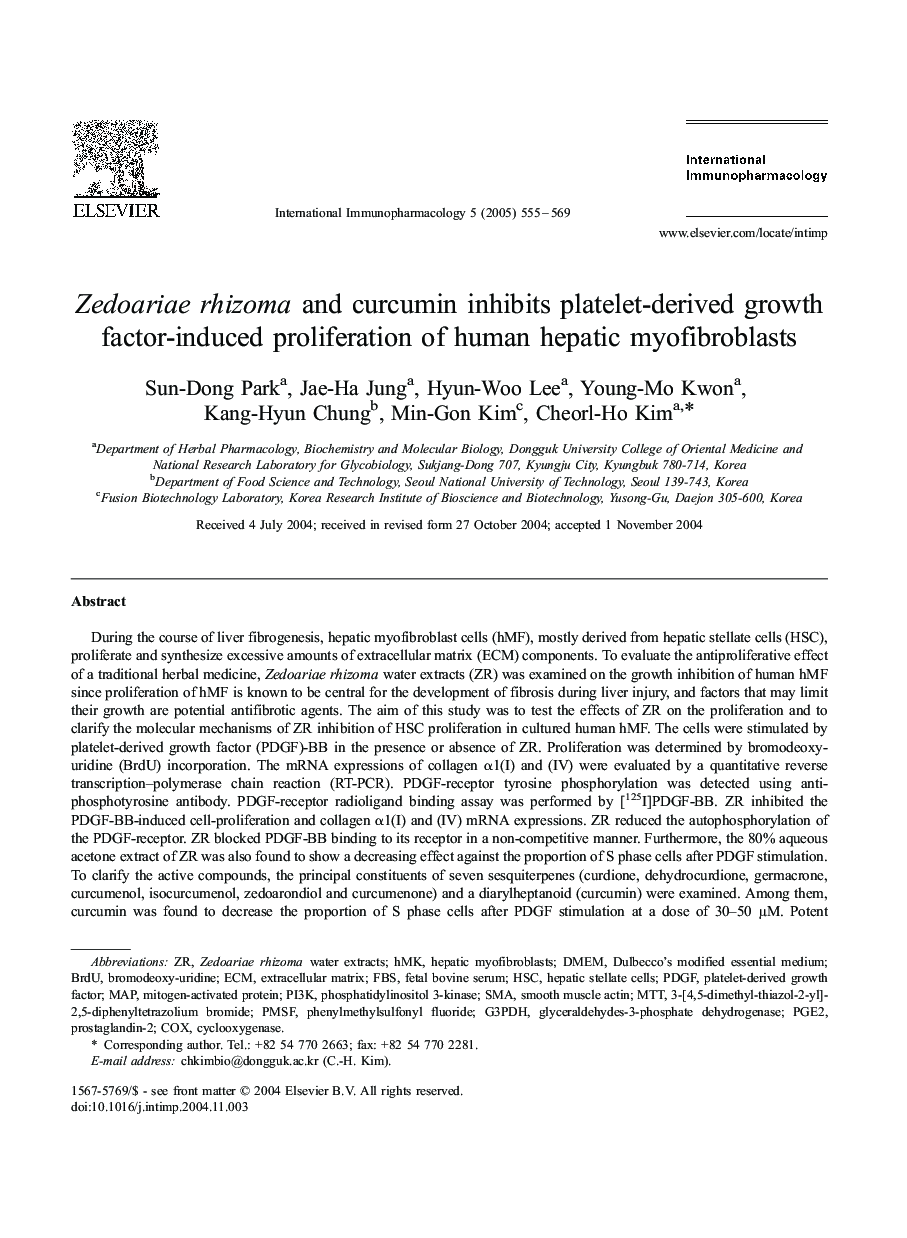| کد مقاله | کد نشریه | سال انتشار | مقاله انگلیسی | نسخه تمام متن |
|---|---|---|---|---|
| 9008257 | 1122744 | 2005 | 15 صفحه PDF | دانلود رایگان |
عنوان انگلیسی مقاله ISI
Zedoariae rhizoma and curcumin inhibits platelet-derived growth factor-induced proliferation of human hepatic myofibroblasts
دانلود مقاله + سفارش ترجمه
دانلود مقاله ISI انگلیسی
رایگان برای ایرانیان
کلمات کلیدی
bromodeoxy-uridineG3PDHHepatic myofibroblastsPDGFCell signal transductionECMPMSFPGE2FBSCOXDMEMHSCPI3KHMKMTT - MTTcyclooxygenase - آنزیم سیکلواکسیژنازsmooth muscle actin - آکنه عضله صافBrdU - بروموداکسی اوریدینCellular proliferation - تکثیر سلولیSMA - دبیرستانfetal bovine serum - سرم جنین گاوHepatic stellate cells - سلولهای ستارهای کبدیplatelet-derived growth factor - فاکتور رشد حاصل از پلاکتPhosphatidylinositol 3-kinase - فسفاتیدیلینواستیل 3-کینازphenylmethylsulfonyl fluoride - فنیل متیل سولفونیل فلورایدLiver fibrosis - فیبروز کبدیLiver fibrogenesis - فیبروژنز کبدیExtracellular matrix - ماتریکس خارج سلولیDulbecco's Modified Essential Medium - متوسط ضروری اصلاح شده Dulbeccomap - نقشهmitogen-activated protein - پروتئین فعال mitogenCurcumin - کورکومینglyceraldehydes-3-phosphate dehydrogenase - گلیسرالید هیدروژن 3-فسفات دهیدروژناز
موضوعات مرتبط
علوم زیستی و بیوفناوری
ایمنی شناسی و میکروب شناسی
ایمونولوژی
پیش نمایش صفحه اول مقاله

چکیده انگلیسی
During the course of liver fibrogenesis, hepatic myofibroblast cells (hMF), mostly derived from hepatic stellate cells (HSC), proliferate and synthesize excessive amounts of extracellular matrix (ECM) components. To evaluate the antiproliferative effect of a traditional herbal medicine, Zedoariae rhizoma water extracts (ZR) was examined on the growth inhibition of human hMF since proliferation of hMF is known to be central for the development of fibrosis during liver injury, and factors that may limit their growth are potential antifibrotic agents. The aim of this study was to test the effects of ZR on the proliferation and to clarify the molecular mechanisms of ZR inhibition of HSC proliferation in cultured human hMF. The cells were stimulated by platelet-derived growth factor (PDGF)-BB in the presence or absence of ZR. Proliferation was determined by bromodeoxy-uridine (BrdU) incorporation. The mRNA expressions of collagen α1(I) and (IV) were evaluated by a quantitative reverse transcription-polymerase chain reaction (RT-PCR). PDGF-receptor tyrosine phosphorylation was detected using anti-phosphotyrosine antibody. PDGF-receptor radioligand binding assay was performed by [125I]PDGF-BB. ZR inhibited the PDGF-BB-induced cell-proliferation and collagen α1(I) and (IV) mRNA expressions. ZR reduced the autophosphorylation of the PDGF-receptor. ZR blocked PDGF-BB binding to its receptor in a non-competitive manner. Furthermore, the 80% aqueous acetone extract of ZR was also found to show a decreasing effect against the proportion of S phase cells after PDGF stimulation. To clarify the active compounds, the principal constituents of seven sesquiterpenes (curdione, dehydrocurdione, germacrone, curcumenol, isocurcumenol, zedoarondiol and curcumenone) and a diarylheptanoid (curcumin) were examined. Among them, curcumin was found to decrease the proportion of S phase cells after PDGF stimulation at a dose of 30-50 μM. Potent antiproliferative and antifibrogenic effects of ZR toward hMF indicated that ZR might have therapeutic implications in chronic liver disease, indicating a novel role for ZR as a growth inhibitory mediator and pointing out its potential involvement in the negative regulation of liver fibrogenesis. In conclusion, ZR has an inhibitory effect on PDGF-induced proliferation of hMF and the blocking of PDGF-BB binding to its receptor may be the mechanism behind this effect.
ناشر
Database: Elsevier - ScienceDirect (ساینس دایرکت)
Journal: International Immunopharmacology - Volume 5, Issue 3, March 2005, Pages 555-569
Journal: International Immunopharmacology - Volume 5, Issue 3, March 2005, Pages 555-569
نویسندگان
Sun-Dong Park, Jae-Ha Jung, Hyun-Woo Lee, Young-Mo Kwon, Kang-Hyun Chung, Min-Gon Kim, Cheorl-Ho Kim,